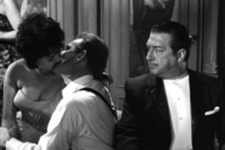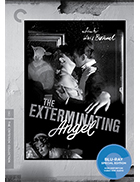The Exterminating Angel (El Ángel exterminador)
|  Like many things in Luis Buñuel’s films, the title of The Exterminating Angel (El Ángel exterminador) doesn’t make literal sense, and its origins are just as murky. The title was originally proposed by the Catholic-communist writer José Bergamin, who claimed that it derived from a passage in the Book of Revelation, which is certainly appropriate given the film’s apocalyptic overtures. The only problem is that there is no verse in Revelation that references an “exterminating angel.” There is, however, such a reference in 2 Samuel when God sends an angel to punish David by inflicting a plague on Jerusalem, but then calls him back (in English the translation is generally “the angel that destroyed the people,” but in French it is “l’ange exterminateur”—“the exterminating angel”). However, to further complicate things, Buñuel regularly gave conflicting accounts as to the title’s origins, saying at various times that it was the motto of a Spanish religious group called the Apostolics of 1828 or that it was inspired by a Valdes Leal painting of an angel scourging a penitent with a whip. Ultimately, it doesn’t really matter where the title came from, which is most likely why Buñuel gave conflicting accounts. When baffled audiences at the 1962 Cannes Film Festival demanded an explanation for the film’s inexplicable events, Buñuel refused. Over the years, critics have tried to offer various metaphorical, political, and symbolic explanations for what happens in the film, to imbue it with meaning that makes sense to them, but such interpretations ultimately fall apart because none of them were intended. Thus, it is probably best to view The Exterminating Angel as Buñuel’s ultimate cosmic joke against meaning itself. The story takes place almost entirely within a stately mansion in which a wealthy couple is throwing a lavish dinner party for 18 friends after an opera performance. However, once they enter the drawing room after dinner, they find that they are inexplicably unable to leave. There is not a physical force or anything tangible holding them back; rather, it is an unmitigated sense of dread that they all seem to share that keeps them from leaving, which binds them together in a state of paralysis. Thus, the film turns into an absurdist, but still chilling chamber piece—a kind of Lord of the Flies parody unwillingly enacted by the upper crust—with the 20 aristocrats slowly decaying both physically and emotionally as they wait out their potential demise in a single room. There is an added level, though, as people begin to gather outside the mansion but find that they, too, are kept from entering and helping those “trapped” inside. In this way, Buñuel literalizes the physical and emotional isolation of the bourgeoisie while also mocking their lack of resourcefulness, which is why he didn’t make the characters working class (“they would have found a solution to their incarceration,” he said). Interestingly, as noted by John Baxter in his biography of Buñuel, this idea of a group of wealthy people trapped somewhere was shared by a number of Latin American writers around the same time, including Julio Cortazar, Alejo Carpentier, Jorge-Luis Borges, Carlos Fuentes, and Gabriel Garcia Marquez. For Buñuel, the basic idea in The Exterminating Angel dated back some two decades, and it fits very neatly with both his previous work in surrealism and his consistent mockery of the bourgeoisie, which here finds a kind of apotheosis with the extravagant dinner party, one of Buñuel’s favorite tropes, eventually degenerating into a microcosm of the end of civilization (which, quite possibly, is realized at the very end of the film). The Exterminating Angel is therefore both a uniquely Buñuelian film, but also one that was particularly suited to the time, when the Spanish aristocracy was crumbling beneath the country’s fascist dictatorship. The film’s insistent lack of answers to the pressing questions it poses reflects both Buñuel’s cinematic playfulness, which he was rediscovering after spending 20 years in Mexico making mostly commercial melodramas on tight budgets, and his view of the world, which is infinitely more baffling and threatening than we like to think. Key in this regard is Buñuel’s use of repetition. Throughout the film there are various repetitions and inconsistencies, some of which we notice and others of which are easy to miss (Buñuel himself said there are about 20). Ritual as a means of asserting class distinction and authority is a consistent theme in Buñuel’s work, and here he uses it against both the bourgeois characters and the audiences who, at the time, were not prepared for a film that contradicted itself and denied explanation (when asked in an interview why he used repetition, Buñuel replied simply, “I felt like it”). It’s a cruel joke, but one that works, even as it produces a film that purposefully frustrates. At various times in his life Buñuel was accused of being a communist, a blasphemer, and a surrealist, but the irony is that none of those labels fit because they all, in some way, attempt to distill the world into something manageable, which is precisely the opposite of Buñuel’s art.
Copyright © 2016 James Kendrick Thoughts? E-mail James Kendrick All images copyright © The Criterion Collection | |||||||||||||||||||||||||||||||||||
Overall Rating: 


 (3.5)
(3.5)


